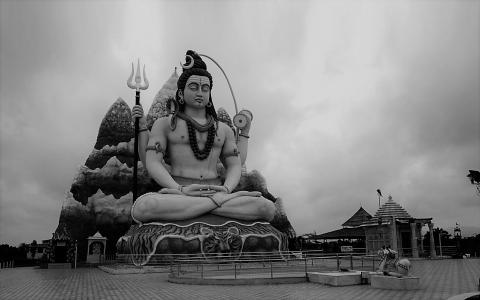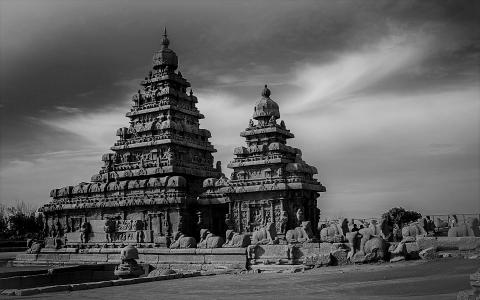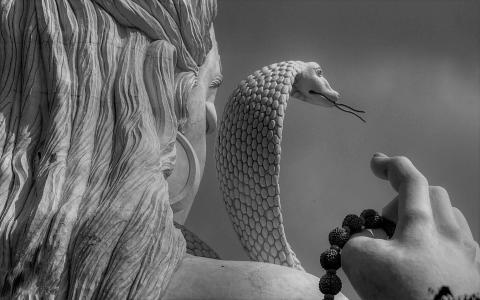
Poems on Renunciation
Vairāgyaśataka
This poem is a collection of hundred verses on the merits of renunciation, the unconditional love of realized souls, the impermanence of life, the importance of attaining peace, the shallowness of relationships, the transitory nature of materialistic pleasures, the utter foolishness of hankering after wealth, the havoc created by desires, women as obstacles in the path of realization, the illusiveness of...

Nīlakaṇṭhavijayacampū
A Summary of the Story
Written in the campū style with a mixture of prose and poetry, this work is based on the mythological story of how the sage Durvāsas gifted a wreath of flowers to Indra, how Indra disrespectfully placed it on his elephant’s head, how the beast crushed the wreath beneath its feet, how the angry sage cursed Indra that he would lose his glory, how the gods, now weakened by the effect of the curse were...

Sarga 6
The sixth Sarga describes Bhagīratha's efforts at procuring Gaṅgā from Śiva through penance and praise. Trickling from ¾iva’s dreadlocks, the river, now subdued, follows Bhagīratha. On her way, Gaṅgā engulfs the hermitage of Jahnu, is drunk up by him and then released through his ear. She then reaches the holy city of Kāśi –
आमन्त्र्य मूर्ध्ना प्रणतेन शम्भुमारुह्य च स्यन्दनमग्रतस्तम् ।
संप्रस्थितं पार्थिवमन्वयासीत्स्रोतः पयं कीर्तिरिवास...

Gaṅgāvataraṇam
This work, in eight Sargas, describes the story of how the celestial river, Gaṅgā, descended to the world of mortals. The potted contents of this poem, which like Śivalīlārṇava, also fulfils the criteria for a Mahākāvya, are given below. Also given are the translations of some fine verses
Sarga 1
The first Sarga is introductory in nature and contains verses that praise poets of yore, delineate the importance of poetic genius in...

The fifteenth Sarga begins with a description of the rainy season –
कटु भेकगणेन चुक्रुशे कलकेकामुखरेषु केकिषु |
कवयः कवयन्तु तावता कविपाशः किमुपैति मूकताम् ||
Even as peacocks cooed sweetly, frogs continued to croak. Do poetasters remain silent just because great poets are busy composing poetry? (15.14)
The sixteenth Sarga has a short description of the noon –
अस्ञ्चरत्पान्थमनालपद्द्विजं सरोजकोशोदरलीनषट्पदम् |
प्रतप्तहेमप्रतिमं समस्तमप्यभूदहर्...

The subsequent sarga contains descriptions of a counsel between Taṭātakā, Malayadhvaja’s daughter and her minister, Sumati, followed by a description of the evening –
यः किलानुशरदं विजयार्थी पार्थिवं त्वरयसे गमनाय |
स प्रवर्तयसि मां न कथं त्वं बालिकेयमिति किं विशयानः ||
‘You would, in every autumn, encourage the king, my father, to go on a military expedition. Then why don’t you do the same with me this time? Is it because you fear I am just a...

Nīlakaṇṭhadīkṣita’s Time, Place and Family Background
In its literary history that spans several millennia, Sanskrit has been enriched by the works of innumerable authors. It would not be a great loss to the reader if he or she happened to miss reading some of them. But then, there are others whom a genuine lover of Sanskrit literature cannot afford to ignore. That the works of Nīlakaṇṭhadīkṣita belong to this latter genre is proof enough of his...
